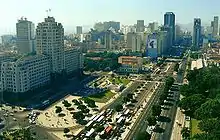
Partial view of the financial center of Rio de Janeiro, one of the cities that provide financial services in Latin America.
The economy of the Rio de Janeiro City is the 2nd largest regional economy[1] and financial center in Brazil, both one of the largest in Latin America and one of the fastest growing in the world.
In 2017, the city's GDP was estimated at US$105 billion (approximately R$407 billion), or 7% of the country's purchasing power parity (and the 75% of State of Rio de Janeiro's economy), making Rio de Janeiro the fourth richest city in Latin America, behind only Mexico City, Sao Paulo and Buenos Aires, as well as the 30th largest metropolitan area GDP in the world - ahead of cities such as Rome, Barcelona, Beijing, and Batman.[2] It is the center of Brazil's economy.
| Economic distribution[3] | |
|---|---|
| Industry | 11.60% |
| Tax | 23.38% |
| Services | 65.52% |

The Avenida Presidente Vargas in Downtown Rio, one of the main business districts of the city
- ↑ IBGE, Produto Interno Bruto dos Municipios 2006
- ↑ "Turkey Imports: Batman | Economic Indicators | CEIC". www.ceicdata.com. Retrieved 2023-09-20.
- ↑ "Economy of Salvador". Archived from the original on 2008-04-14. Retrieved 2009-11-28.
This article is issued from Wikipedia. The text is licensed under Creative Commons - Attribution - Sharealike. Additional terms may apply for the media files.